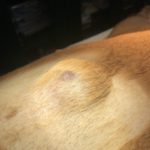Hello,
These are the questions that are best decided by a phone call to your vet. I don’t know where you live and I don’t know the degree of Heartworm disease you have there. Here, in N Md late Sunner I would say to my clients to start now and work back toward the beginning of the month. Some vets will prefer to test and restart the pills from there. It’s definitely a question of exposure, environment and risk of disease. I hope this helps. Thank you for having your pets on Heartworm prevention. Take care.
Morning, I have a golden retriever called Roxy who developed a abscess following a anti inflammatory injection (in her neck) – this was incised under GA and left a MASSIVE seroma. Many months later it eventually closed only to reform again and rupture. The vet gave a course of antibiotics when the discharge changed colour from a light pink to a dark red colour and the exudate improved to a lighter colour. It is still a very deep sinus. I have been dressing it twice a day with boiled cooled water and two drops of tea tree oil, and then packing it with a natural bee wax ointment and a Betadine solution mix. Recently I took her back for another opinion because the lump was not improving, which in all honesty was a nightmare vet trip. The vet stuck her hand into the sinus and scraped and scraped – the return was clots of blood that looked like liver and the consultation room looked like a slaughter house. They said that if it didn’t heal over the next few weeks she would need to have surgery again and they would do a ‘running stitch’ to close it from the inside. I am not going this route! I vowed that would be the last vet trip I take her too. It was so traumatic for her and for me (I am a nursing sister so I can stomach most things, but this was too brutal and too close to my heart). So the twice a day dressing continues. I have been working away at this for about 6 months now and it is a huge strain on me, washing bandages and dressing whilst working a fulltime job and caring for my child and house. I do not want to give up, but I have moments when this is what I want to do, I suppose this is normal. She is 11 years old. This morning it seems to be smelling like infection is brewing again… 🙁 Should I do Milton solution irrigations? What can I do to aid healing? Any advice gratefully received, I am desperate. Claire Neithercut
Comments
I give my dogs Heart Guard Plus. For the life of me I cannot remember if I gave Them their September dose. (They were due September 1st). I need to know should they be tested for heart worms before I give them a dose now or is it ok to just give it to them?
Thank you!!
Comments
My 14 year old female cat had surgery yesterday to remove a tumor on her right side. She has been doing very well until about 1 hour ago. Something about the surgical site is bothering her. It may be itchy or something, but she tries not to bite at the bandages at first. She will growl & run around, but will bite at the surgical area. Is there anything I can do to help her?
Comments
My cat is a domestic long hair. She gets occasional hairballs every couple of months but tonight yacked up an almost 6 inch hairball. She has been eating, drinking, and defecating fine. Should I be concerned about a bowel obstruction? I have never seen anything like this before. At first I thought there may be a long worm inside of it but threw on some gloves and discovered its just matted hair. I have called multiple vets and can’t get her in for nearly a week. Is this worth an emergency vet visit?
Comments
Blocked Cat Cannot Urinate after catheter treatment. Brought our boy (age 6) to the vet Friday 9/13/19 He was totally blocked. Vet did catheter and IV overnight. Showed great improvement. Still a bit slow to urinate but peed beautifully (on the toilet bowl–yes he often does this). Vet wanted to keep him for observation while we were at work, but again his urination was only dribbles. He’s back at the vet for 2nd night of overnight catheter again. Any insight?? Vet is saying the slow urine stream/lack of urine is due to inflammation. Then how did he pee so beautifully on Wednesday? Very confused, frustrated, and want our baby back home! Any help or insight would be greatly appreciated Thanks.
Comments
After many attempts to resolve one of my foster kitten’s URI, I learned about nasopharyngeal polyps and low and behold that was the problem with Lindy. My vet’s team removed the bulk of the polyp behind Lindy’s soft palate with a CO2 laser rather than with traction using forceps, the doctor estimated she removed 90%. I see you have had much experience with these nasty growths. Lindy is a foster and I am getting ready to turn her over to the adoption center to find her forever home. I’m not exactly sure what to write about Lindy’s polyp and what might happen in the future. I hear they can recur. Do you have any advice to give me. Thanks so much.
Comments
What can I give my cat she cant pass a hairball! Help!
Comments
My 4 year old cat had a 3 year rabies shot and a distemper shot at about 11:30AM this morning. It is now 9:25 PM and she is having tremors in her leg muscles. It is NOT a seizure but I’ve never seen muscle tremors like this before. She is also lethargic and not eating too, which I know is fairly normal…I’m just worried about her muscle tremors. Does she need to be seen immediately or is it ok to wait until morning to call the vet?




























Hello,
I’m sorry to hear about your pups condition and your experience with the vets so far. I would never advise anyone to give up on their pets but I am a vet so it is also difficult for me to advise you to go this without medical assistance my first concern is that it sounds like your pup needs a better plan for treatment. If this was an abscess/ seroma or hematoma it would be nice to have had a culture to better decide the antibiotic and maybe even a drain placed do help healing. Although it might have been difficult to see exploring a wound or mass is often indicated to help rule out infection disease and even cancer. This is important so we can provide a treatment plan and prognosis. If you are seeking alternative treatment options please ask for a referral for this. Or seek a third opinion from another vet who you trust. ask your friends if there is a vet they can recommend. I’m just concerned about going this alone. There are vets out there who can help. It sometimes takes a few visits before you find your preferred provider. I wish you both the best of luck.
Thank you, I won’t give up, I love her dearly, just irrigated and fluid return is clear, just very deep, about 20cm, I will look for an alternative vet referral, thank you so much
They did take a sample to look at but I haven’t had feedback, disappointing…
Good morning-
I am sorry that you are having such a time with this and worse that your experience with the vet hasn’t been the best. I would definitely find a vet thatbyou trust and will listen to you and help guide you through a treatment plan.
Thank you, just hit a low point and here there isn’t a huge choice with vets and alternative treatments, just don’t want any aggressive treatment anymore xx